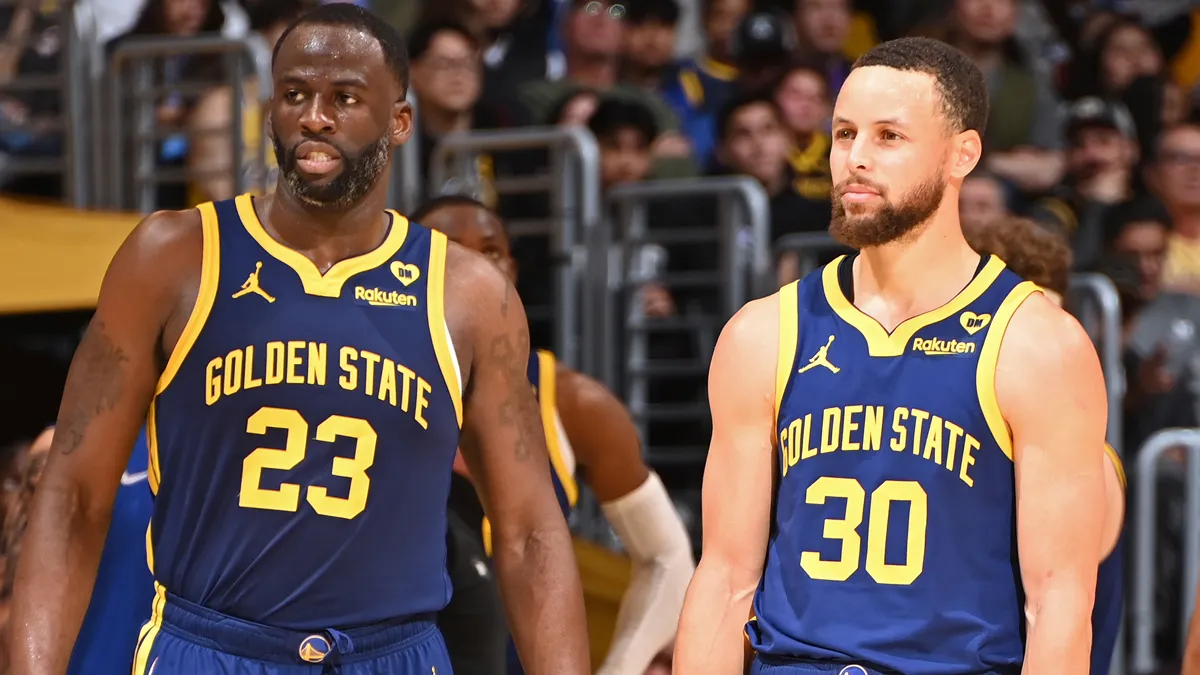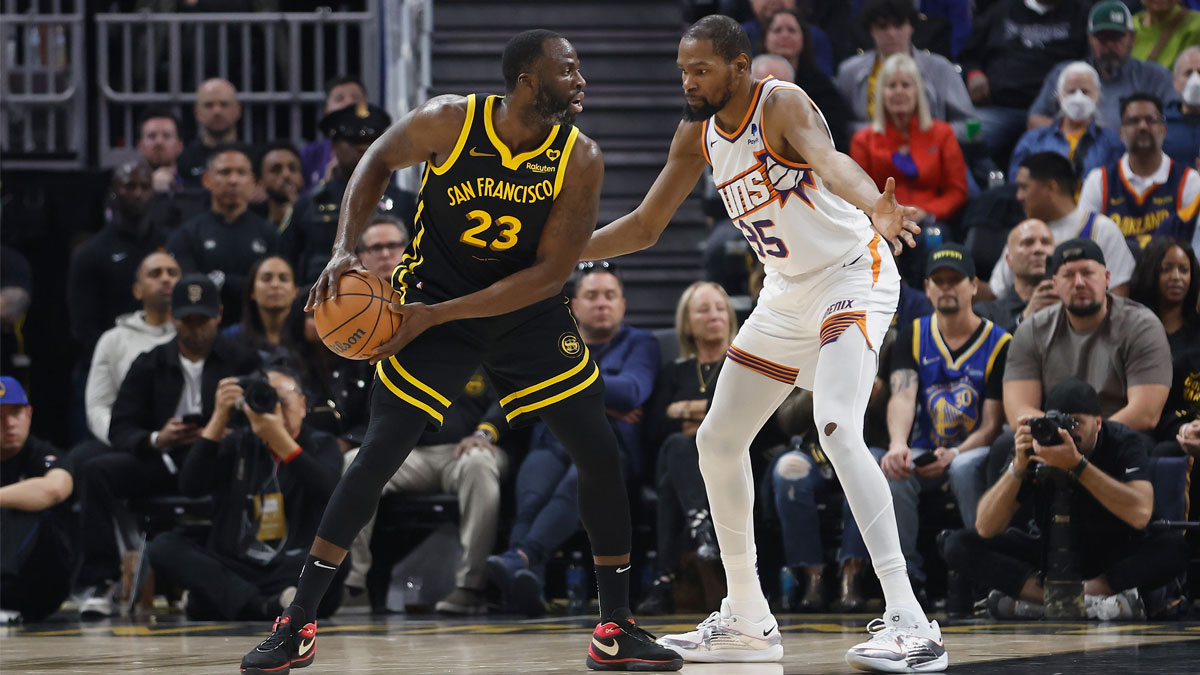Mike Dunleavy Jr.’s tenure as the Warriors’ next general manager began with a dose of what’s ahead of him.
Draymond Green declined his $27.5 million player option, becoming an unrestricted free agent this summer. Green’s decision wasn’t a surprise to those within Golden State, and made the most sense for the 33-year-old in basketball and business terms. Dunleavy couldn’t get into specifics, though made it clear how strong his desire is to keep Green in a Warriors jersey.
“We really want Draymond back," Dunleavy said. "What he means to this organization, this team, in terms of trying to win at the highest level, we feel like we have to have him. That’s very important.”
Stay in the game with the latest updates on your beloved Bay Area and California sports teams! Sign up here for our All Access Daily newsletter.
Green has said he wants to remain a Warrior. Dunleavy wants him here, as does Joe Lacob, Steve Kerr, Steph Curry, Klay Thompson and many others. That has been said and will be reiterated. Now comes the hard part, and the trust of building out a roster made to contend in the immediate future.
The theme of Monday’s press conference was continuity, as it has been for the Warriors well before Dunleavy stepped into his new role. Changes will be made in the front office, on the coaching staff and throughout the roster. How many changes, and how big of changes will be determined in the coming weeks. Dunleavy will need time to settle in, though time isn’t his friend right now.
Nor is it for a handful of other players currently on the roster.
Jordan Poole turned 24 years old on Monday and is entering his fifth pro season, all while his four-year contract extension kicks in once the new league year begins in October. Jonathan Kuminga and Moses Moody, two players taken in the lottery of the 2021 draft, still will be only 21 years old for the duration of next season but no longer have rookie excuses.
Golden State Warriors
Find the latest Golden State Warriors news, highlights, analysis and more with NBC Sports Bay Area and California.
Training wheels no longer are expected for the two, and Dunleavy knows it. Poole’s third season was his breakout campaign before taking a step back in a handful of ways this past season.
“As most players find by the time you get into your third year, sometimes it takes up to four, you end up being pretty good,” Dunleavy said. “That's just kind of the time to make that jump. We're hopeful that's the case with these guys. Aren't necessarily babies, young guys, rookies any more. They should be able to be strong, contributing players that can complement our older guys. I think that's the hope.
“Those guys are on track, certainly working hard, putting the time in. I think we're confident with what they can do moving forward.”
Between the three of them, Poole is the one who has got the job done as a champion, earning him a four-year contract extension last offseason that guarantees him $123 million. At the time he was coming off a year where coaches and teammates were clamoring for him to the NBA’s Most Improved Player after averaging 18.5 points on 44.8/36.4/92.5 shooting splits.
Poole’s start to the postseason was historic and brought real belief in him being a Curry disciple who can carry the torch going forward. He averaged 17.0 points on 50.8/39.1/91.5 shooting splits in the playoffs. A party was in motion and confidence oozed out of his pores.
The same player, the same confidence wasn’t there a season ago. Of course Green’s infamous punch didn’t do him any favors. Neither did his numbers.
Poole did average 20.4 points at 23 years old, a number that can’t be overlooked. Neither can his field goal percentage dropping to 43 percent, his 3-point percentage falling to 33.6 percent and his turnovers per game rising to 3.1. Poole doesn’t miss games, played through an ankle injury in the playoffs, but also was unplayable at times when Steve Kerr needed him.
On a team that features Klay Thompson playing the same position, Poole has averaged 22.5 points as a starter over the last two seasons and only 15.0 coming off the bench.
“Jordan, especially with his contract extension, we plan on having him four more years at least,” Dunleavy, who was high on Poole as a scout going into the 2019 draft, said Monday of the young guard.
Kuminga is the mystery, the mega athlete who might have all the skills but hasn’t put it all together mentally and physically at times. When Andrew Wiggins missed two months last season tending to a family matter, Kuminga averaged 13.4 points on 56.3 percent shooting and 44.4 percent from 3-point range, playing 24.1 minutes per game. Kuminga then received three DNPs (Did Not Play) in the playoffs and played 6.1 minutes a night.
The six players taken ahead of him in the 2021 draft have all averaged at least 25 minutes per game. Those six players combined also have averaged 15.8 points. Kuminga in his first two seasons is averaging 9.6 points and 18.8 minutes on a team that has Wiggins ahead of him, and presumably Green as well.
“Jonathan has shown progression and growth in his first four years,” Dunleavy said. “Unfortunately for him, the playing time hasn't been there. That's on all of our shoulders to figure out how do we get him in the game more. It's on Jonathan's shoulders to improve and make the right adjustments to his game, as well as our front office, our coaching staff figuring out what works.”
Both Poole and Kuminga have been mentioned in trade rumors, showing the value their talent holds but also the decisions Dunleavy and the Warriors must make. Moody wasn’t asked about Monday, and he didn’t need to be.
Dunleavy said his goal in the draft is finding a “really good basketball player.” Even if Moody doesn’t rack up All-Star Game appearances, the trust he instills in coaches and teammates is who the Warriors want to be and who they have been in championship seasons. Moody was a DNP in the Warriors’ first playoff game last season, and then played more than 13 minutes per game the rest of the way as a trusted fixture in the rotation.
There is no more hand holding. There is only one timeline, and for as much as Dunleavy believes in the Warriors’ young talent, hope sometimes has an expiration date. An abundance of challenges lie ahead, and the Warriors believe Dunleavy’s basketball acumen makes him the right man to choose reality over clutching onto desires.


